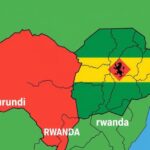Burundi President’s Allegations Against Rwanda Deemed Unfortunate by Foreign Minister Nduhungirehe
Rwandan Foreign Minister criticized President Ndayishimiye’s claims of an impending Rwandan attack as “unfortunate.” Ongoing military discussions seek de-escalation amid heightened tensions due to Burundian military actions in DR Congo. Allegations of Burundian troops collaborating with extremist groups complicate regional relations.
Olivier Nduhungirehe, the Foreign Minister of Rwanda, described the allegations made by Burundian President Evariste Ndayishimiye asserting that Rwanda intends to launch an attack as “unfortunate.” Nduhungirehe noted that these claims emerged during discussions between military and intelligence authorities from both nations aimed at achieving military and verbal de-escalation.
The Minister emphasized that dialogues were ongoing, with the intention of fostering mutual understanding and alleviating tensions linked to the ongoing conflict in eastern DR Congo. Ndayishimiye’s assertions, made during an interview with the BBC, lacked substantiation and were regarded as a misrepresentation of the current state of affairs.
On social media, Nduhungirehe remarked that both nations had initially shared common viewpoints regarding military and de-escalation discussions. He expressed hope for a more serene discourse from the Burundian side. Relations between Rwanda and Burundi have recently soured due to the involvement of Burundian troops in a coalition with Congolese forces against M23 rebels, raising concerns regarding potential aggression toward Rwanda.
Prior disputes escalated when President Ndayishimiye accused Rwanda of orchestrating a December 2023 attack by the RED-Tabara group, with which Rwanda firmly disagreed. Furthermore, Burundi unilaterally closed its border with Rwanda amid rising tensions between the two governments.
As the conflict intensified, the East African Community Regional Force was deployed to assist in restoring stability in the region. However, the involvement of Burundian forces aligned with the Congolese army against M23 rebels has drawn criticism from Rwanda.
Nduhungirehe has questioned the rationale behind the Burundian military’s collaboration with the historically destructive FDLR group, accusing it of complicity contrary to their stated intentions of combating armed groups in the region.
Moreover, reports from the Masisi territory indicated that Burundian troops did not intervene during attacks by extremist militias on Congolese Tutsi villages. These actions have raised significant concerns regarding the alleged collusion between Burundian forces and genocidal militias, further complicating the situation in the already volatile region.
Scholar Bojana Coulibaly highlighted testimonies from residents, suggesting that Burundian troops tacitly supported attacks on Tutsi civilians, further exacerbating the tensions and distrust between Rwanda and Burundi. The evolving geopolitical dynamics in eastern DR Congo remain precarious, with various factions involved in a complex web of alliances and hostilities.
In summary, Foreign Minister Olivier Nduhungirehe refuted the accusations made by Burundian President Evariste Ndayishimiye regarding Rwandan aggression, highlighting ongoing discussions aimed at de-escalation. With rising concerns over the involvement of Burundian troops in the eastern DR Congo conflict and allegations of complicity with extremist groups, the intricate relationship between Rwanda and Burundi continues to necessitate careful diplomatic navigation to ensure regional stability.
Original Source: allafrica.com








Post Comment